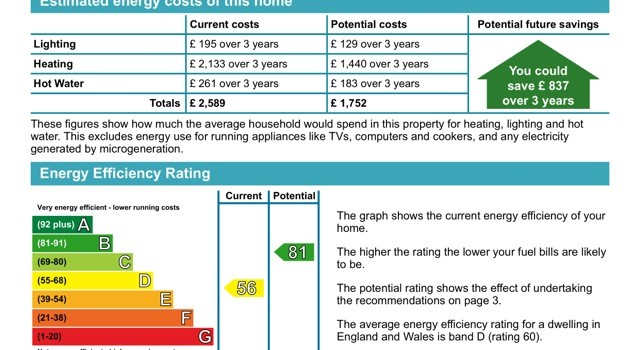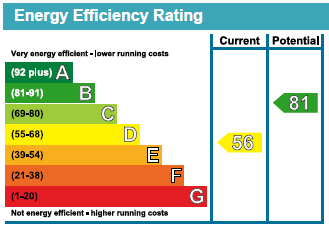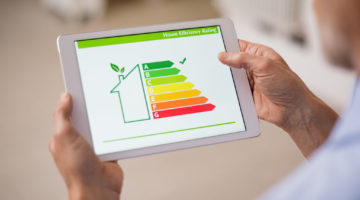
What is an EPC?
An Energy Performance Certificate is a document which details the energy rating of your property (much like the rating system for appliances). This includes a breakdown of current efficiencies of certain aspects of the home, like the heating system, the walls, the windows as well as identifying ways to improve the efficiency of the home.
The EPC rates your house between 0 and 100, with a lettering scale of A to G associated with it. The average home in the UK is a 60, or D rating, but there is considerable variation depending on the type of property and the efficiency measures that have been carried out.
Does my home have an existing EPC?

There is an online register (www.epcregister.com) where you can find any EPC produced. If your property has an existing EPC, it will be found here.
If you are buying a property, or looking to become a tenant, the owner or estate agent should be able to provide you with the EPC for the prospective property.
Once you get your hands on the actual EPC report, you can see the date that it was completed – if it was more than 2 years ago it is quite likely now that it will be inaccurate, however an EPC in theory is good for 10 years from the lodgement date.
What do I need an EPC for and where do I get one?
Since 2007 it has been a prerequisite if you are selling, renting or building a property. If you are renting out a property for more than four months a year, you will need an EPC. Remember, you need to get this done before you market your property, otherwise you could face a fine.
Most estate agents can arrange for an EPC to be completed on your property however they usually charge a lot more than an independent company sometime charging in excess of £120. TheGreenAge will carry out an EPC across Greater London from just £50 (+ VAT).
New EPC Regulations
It is also worth noting that from 2018 you will not be able to rent your property if it has an EPC rating of 38 or less (band F & G). Therefore it makes sense now to start making the changes to your home to ensure it adheres to the new legislation.
Is an EPC useful?
The EPC can be really useful as it gives you an idea of the things to target to lower your energy bills, however since most people get an EPC just to sell their homes, they are often seen as an extra expense – a box ticking exercise. If you take the time to look, it can reveal a lot about your property, and what you should be looking to do to improve its energy efficiency.
People often have a somewhat distorted view of what constitutes a worthwhile efficiency improvement for their home. People get fixated on a new boiler or double-glazing when simple draught proofing or loft insulation is far cheaper and will do much more to reduce their bills. An EPC gives you the information required to see which measures you should target first.
On the EPC you will see a section with approximate savings for each proposed measure, along with the increase in energy rating associated with this improvement. Comparing the savings you will make to the cost of the measure is a really useful way to work out the best next steps for your home.
Drawbacks of EPC’s
Unfortunately, because EPC’s don’t take into account how you actually use energy in the home (e.g. how many people live there, how warm you like your rooms, how much hot water you use), they aren’t the most accurate tool for seeing how much you will save from certain measures.
For example, a house with 6 occupants and an average thermostat setting of 24 will use a lot more energy than a single occupant living in the same home who has the thermostat set to 18 degrees, even though an EPC would cite the same savings for both.












2 comments